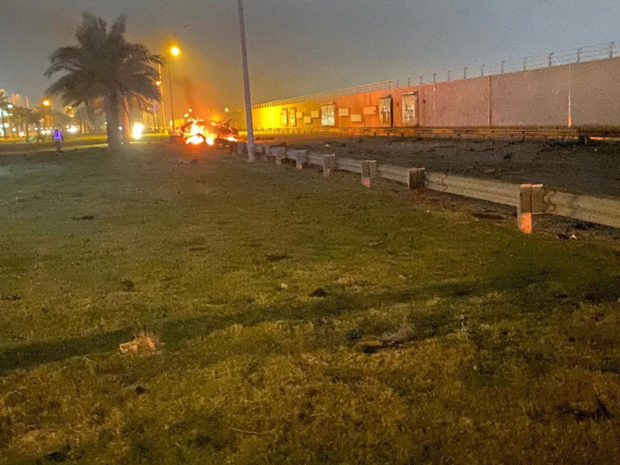
This photo released by the Iraqi Prime Minister Press Office shows a burning vehicle at the Baghdad International Airport following an airstrike, in Baghdad, Iraq, early Friday, Jan. 3, 2020. The Pentagon said Thursday that the U.S. military has killed Gen. Qassem Soleimani, the head of Iran’s elite Quds Force, at the direction of President Donald Trump. (Iraqi Prime Minister Press Office via AP)
BAGHDAD — The United States has urged its citizens to leave Iraq “immediately” amid “heightened tensions” in the region following the death of a top Iran general.
A State Department statement on Friday cites “heightened tensions in Iraq and the region” as with Iran vowed “harsh retaliation” after a U.S. airstrike killed Iran’s top military commander in Baghdad.
The State Department added that “due to Iranian-backed militia attacks at the U.S. Embassy compound, all consular operations are suspended. U.S. citizens should not approach the Embassy.”
That comes after a crowd attacked the embassy earlier this week to protest U.S. airstrikes against a militia supported by Iran.
Iraq’s outgoing prime minister has sharply condemned the U.S. airstrike that killed Iran’s Qassem Soleimani, and senior Iraqi official, Abu Mahdi al-Muhandis, near Baghdad’s airport, and called for an emergency parliament session to take “necessary and appropriate measures to protect Iraq’s dignity, security and sovereignty.”
Prime Minister Adel Abdul-Mahdi said Friday the men killed were “major symbols in achieving victory against” Islamic State group militants. He called the attack that killed Al-Muhandis an “aggression against Iraq.”
“Liquidation operations (assassinations) of leading Iraqi officials or from a friendly country on Iraqi soil is a brazen violation of Iraq’s sovereignty and blatant attack on the nation’s dignity,” Abdul-Mahdi said.
He called the attack “a dangerous escalation” that is set to ignite a destructive war in Iraq and the region. He added it is also an “obvious violation of the conditions of U.S. troop presence in Iraq, which is limited to training Iraqi forces” to fight IS militants.
Earlier, the head of Iran’s parliamentary committee on national security and foreign policy has threatened U.S. forces in the Middle East during an interview on state television.
Hard-line lawmaker and cleric Mojtaba Zolnouri made the threat Friday, and told state TV: “When the U.S. is killing Iranian forces outside of Iran, the U.S. must see its troops killed at its bases in the region.”
A senior Revolutionary Guard commander, Gen. Mohammad Reza Naghdi, said that “the White House must leave the region today or it must go to the market to order caskets for soldiers.” The general added: “We don’t want bloodshed. They have to choose by themselves.”
Iran’s Supreme Leader Ayatollah Ali Khamenei has likewise warned that a “harsh retaliation is waiting” for the U.S. And Iran’s cabinet spokesman, Ali Rabiei, said in a tweet that Iran’s severe response won’t be far away.
Meanwhile, Syria has strongly condemned the airstrike that killed Soleimani even calling it a “treacherous American criminal aggression”. It then warned that such an act constitutes a “dangerous escalation” in the region.
Soleimani, head of Iran’s elite Quds Force, was considered the architect of Iran’s policy in Syria.
According to the Syrian foreign ministry, the attack reaffirms the U.S. responsibility for the instability in Iraq as part of its policy to “create tensions and fuel conflicts in the countries of the region.”
The statement said the attack will only strengthen the resolve to continue down the path set “by the martyred leaders of the resistance against American interference in the affairs of the countries of the region.”
Iran’s foreign minister, for its part, said the U.S. airstrike “without any doubt is an act of state terrorism.”
Mohammad Javad Zarif also called the airstrike a violation of Iraq’s sovereignty.
“Perhaps America’s action was a response to the pain that this great man had inflicted on them,” Zarif said of Soleimani.
The killing will make Iran’s people more united and “will also make U.S. policies more scandalous and less effective than before,” he said.
The targeted killing could draw forceful Iranian retaliation against American interests in the region and spiral into a far larger conflict.
The US Defense Department earlier said it killed Soleimani because he “was actively developing plans to attack American diplomats and service members in Iraq and throughout the region.”
An adviser to Iran’s President Hassan Rouhani subsequently warned U.S. President Donald Trump of retaliation.